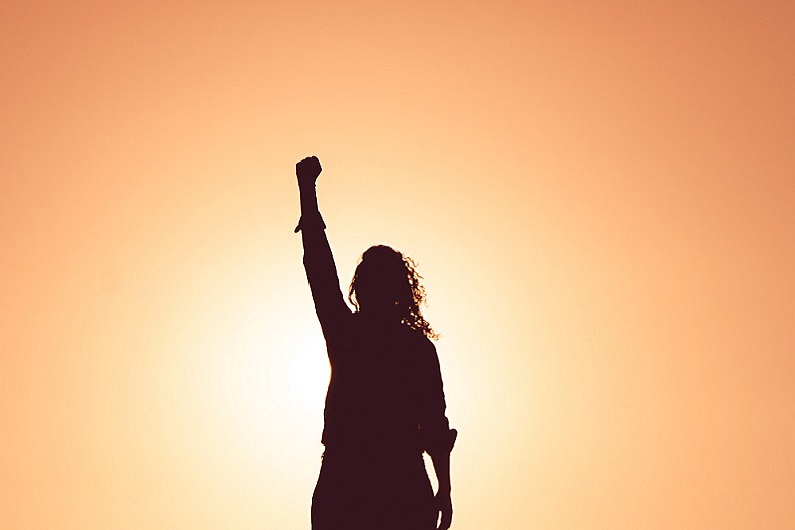Highly sensitive activist? Is this a thing? Honestly, I’m not sure, but I invite you to come forth and make it one because your care, complexity, and courage are needed.
Whether you already see yourself as a highly sensitive activist or are reluctant to consider yourself as such, I believe you’ll find the tips in this article helpful in how you can bring yourself to the world.
Highly sensitive people can make strong, effective activists. You may feel the injustices of the world deeply and want to have an impact. Yet, you might get stuck feeling overwhelmed and distracted and hesitate to get active. Or maybe you have been involved in activism and experienced burnout or compassion fatigue.
Stepping forth and holding focus while preventing depletion requires a true balance of beneficial action and supportive rest. Balance gets talked about a lot, but I want to dig a little deeper into the nuance of what this really means, as I discuss some of these key ingredients for sustained activism.
Today I want to share some tips with you for how to manage your energy and perspective as a highly sensitive activist so that you can get involved, stay engaged, and prevent burnout.
First, I’d like to say more about why I’m writing this.
I recently wrote a call to action to my email list to bring forth the strengths of sensitivity in support of Black Lives Matter.
I heard from people who want to do something but question whether they can make a difference. I also heard from folks that are struggling to cope with anxiety amidst the many societal changes and personal hardships and don’t feel they have the energy to put forth.
I get the frustration and despair. And I hear that many of you are working through healing of your own.
I also know many of you face constant anxiety related to your experience as a person of color in a world in which you have to teach your children how not to get killed by those who are supposed to protect.
White readers, please read that again. Added daily anxiety because of the color of your skin.
Yes, it IS our collective duty to examine ourselves and systems we live in while advocating for policies that promote real social justice.
We must engage in deeper work that heals collective trauma that many Black and Indigenous People of Color (BIPOC) face every moment of every day.
But does your voice and action make a difference? What if you feel like you’re at your capacity?
I’d like to share how I build reserves and manage my own sustainable fuel needed for the long haul of individual and collective healing as a highly sensitive activist.
6 Tips for the Highly Sensitive Activist
1) Know your overarching purpose. Highly sensitive people thrive on purpose. Get in touch with your “why” behind your actions. Knowing what you’re committed to fighting for will help you regroup and refocus when things get tough.
When I consider my purpose, I draw wisdom from yoga teachings and social work values that have informed my life. You may have other wisdom to draw from, here are mine:
- Yoga asks me to live in accordance with dharma, which includes taking wise, just, and beneficial action toward that which upholds collective good for all beings and the planet.
- Social work perspective asks me to apply systems theory to understand how environments and individuals interact and take action at the point of this intersection.
Both ask me to listen to the experiences of others. And they ask me go beyond myself and the people closest to me and make it clear that it’s incumbent upon me to widen my circle of care from my individual reality to the greater good.
2) Take beneficial action without attachment to the outcome. This might be one of the most critical perspectives that helps me keep going when it feels like the world is falling apart.
The problems of the world can feel overbearing to a highly sensitive activist. There are moments when you’ll wonder if your efforts are pointless. In those moments, I remember Krishna’s words in the Bhagavad Gita (paraphrased from a yoga text about conflict in a setting of conflict):
You may not control your environment, other people, or even the results of your actions. Yet, you DO have control over your own actions. Do your duty for the sake of the action itself and not the fruit of those actions.
Of course, expectations or desired outcomes are normal and necessary. Without them, you may not act. The teaching here is that you are responsible for just action toward collective good, even if it doesn’t yield your intended outcome. (Also embedded here is that there is always more than meets the eye and the ripple effects of your actions, karma, are unknowable.)
Adopting and living this perspective can free up your busy HSP brain for other matters. So…write the letter. Create provocative art. Donate money. Canvas your neighborhood. Do the right thing regardless of the immediate results (of course, knowing that sometimes the course of action will need to be reevaluated).
3) Name and celebrate successes. Just because you don’t control the full results of your actions, doesn’t mean that the collective contributions and positive outcomes shouldn’t be recognized. Systemic change is a slow process made up of many smaller milestones.
Even though there’s urgency, pay attention to the little victories and celebrate them. Incremental successes can be the fuel that keeps you and your community going and builds broader support for the cause.
Consider the concept above of not knowing the full ripple effects of your actions. Likewise, the results of your actions will ripple out into the future beyond your lifetime.
Take a look at what the first 10 days of sustained protests accomplished for Black Lives Matter.
4) Consider engaged action as healing action. When you have a lot on your plate, you may feel like you don’t have much energy left to take action. You might feel like you need to focus on yourself right now.
Self-care is important. At the same time, engaged action is also an empowering vehicle for healing and managing the other challenges of life.
If you struggle with anxiety or are working through trauma, you know how impactful it is when you tap into your sense of personal agency. Personal agency brings the locus of control back to you.
Engaged action in your own life reminds you of your resilience and capacity. Engaged action in your community reconnects you to the depth of your humanity and immerses you fully in life. Both play essential roles in individual and collective healing journeys.
You don’t have to do all the things as a highly sensitive person. Consider your skills and how you can apply them to affect positive change. Determine your bandwidth and set a plan of action for yourself within those parameters. Start small and grow from there.
5) Rest and restore. Self-care is a term that gets thrown around so much these days as temporary pleasure that it makes many of us want to throw up a little (as one person said during a recent yoga and reflection group)… the same way that “yoga as an escape” bothers many of us teachers since it is so far from the purpose of yoga.
Self-care is not an excuse to avoid discomfort or what’s in front of you to do. It’s making supportive (non-shaming, non-prescriptive) choices. It’s using discernment to set boundaries and know when to say no. It’s carving out space for your grief and emotions.
Notice when you feel resistant to resting. This may be when you need it the most.
Restful practice is vital to replenishing your highly sensitive reserves and capacity so that you can continue to show up tomorrow for yourself, those around you, and your work.
6) Choose your battles wisely. This is something I constantly have to reign myself back in with. And it relates to when and how you use your voice.
If you’ve been following the discussions on anti-racism, you know that many activists are asking you to have that “hard conversation with your racist uncle” or “call out racist behavior” on social media.
This is incredibly important and we need to take that call to heart and live it. Yet, without nuance as to when and how to do this, you can easily find yourself on a fast road to depletion and massive frustration. This doesn’t mean you don’t do the tough thing, it just means to apply consider when and how you direct your energy. Here are some questions to keep in mind:
- Have you had the same circular conversation with your relative at every family gathering? If so, consider preserving your energy. Maybe you express your view and set boundaries, but if you’ve been down that road, don’t take the bait.
- Are you in a work meeting in which your Black colleague is being asked to do the emotional labor of speaking for all Black people? This might be a time to say something. Yet, the when and how require tremendous discernment based on the context, power dynamics, and manner in which you say something. Here are some considerations for allyship worth reading.
- Is your high school buddy who is a generally kind person sharing memes with racist undertones? Consider “calling him in” with a private message rather than shaming him on his Facebook page. He may be more likely to listen (and even remove the post).
Highly sensitive activist, you’re going to get tired and you’re going to make mistakes. Yet, your passion, voice, and engaged action are needed for collective healing.







